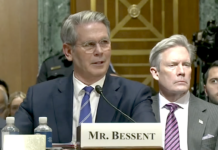
WASHINGTON (States Newsroom) — A Washington state man’s efforts to transfer his Purple Heart benefits to his children were the impetus for a bipartisan bill that seeks to change the law for veterans who receive the distinguished award.
The “Purple Heart Veterans Education Act,” sponsored by Sen. Patty Murray (D-Washington) and Sen. Thom Tillis (R-North Carolina), would allow veterans who served on or after Sept. 11, 2001, to transfer their education benefits to one or more dependents.
Closing the loophole
The bill was unveiled shortly before Memorial Day, and Murray told her constituents the effort was spurred by a Purple Heart recipient named Pat, who had recently been told by the Army that he could not transfer his benefits to his children because he received the Purple Heart after being medically discharged.
“As the daughter of a Purple Heart recipient, I’ve seen firsthand the enormous sacrifices Purple Heart veterans make to defend our freedoms, and I feel strongly that we should be doing absolutely everything we can to help all veterans and their families thrive,” Murray said.
“It doesn’t make any sense that service members who are awarded a Purple Heart after their service can’t transfer their GI benefits to their dependents, while those who receive it during their service can — and I am grateful to Pat, my constituent in Washington state who brought this gap in the law to my attention.”
Murray said the bill “will close this loophole and allow more children of Purple Heart veterans to further their education.”
‘Needs to be corrected immediately’
“Purple Heart recipients are heroes who honorably served our country at great costs, and this oversight that prevents servicemembers who received this distinguished award after their service from transferring their GI bill benefits to their dependents needs to be corrected immediately,” Tillis said.
The number of veterans who retroactively received the Purple Heart after their post-9/11 service is unclear. According to an informal analysis by the nonpartisan Congressional Budget Office, the bill is estimated to cost $500,000 in mandatory spending over 10 years.
Veterans groups, including the Iraq and Afghanistan Veterans of America, praise the bill.
“Unfortunately, not every veteran’s service and sacrifice on behalf of the United States of America is fully recognized while they’re still in uniform,” IAVA CEO and Iraq War veteran Allison Jaslow said in a statement Thursday.
“The Purple Heart Veterans Education Act ensures that those veterans who’ve endured bodily harm on behalf of our nation but weren’t recognized for it until their service concluded are able to turn that recognition into an investment in the education of their loved ones.”
More Purple Heart recipients
The wars in Afghanistan and Iraq have “greatly increased” the number of Purple Heart recipients as the Department of Defense has added some traumatic brain injuries as a recognized condition for the award, according to the nonpartisan Congressional Research Service.
It wasn’t until a 2017 law that Purple Heart recipients were able to receive full post-9/11 GI Bill benefits regardless of their length of service. Previously, the recipients had to have 36 months of active service.
The Department of Defense does not maintain a record of the number of recipients, according to the CRS, but by law they do maintain a publicly accessible list with the permission of the veteran or next of kin.
Military historians and the National Purple Heart Hall of Honor estimate about 1.8 million Purple Hearts have been awarded since 1932. The Army Historical Foundation estimated as of 2016 that 30,000 Purple Hearts had been awarded since 2001. The CRS cited this statistic.







